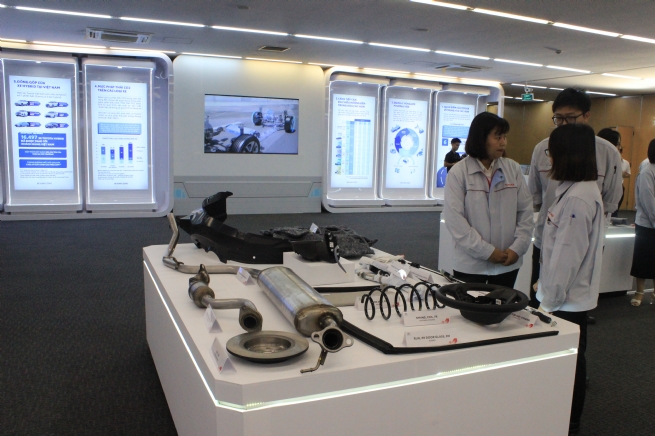Vietnam is a Strategic Destination in the Global Supply Chain
This was the assessment of Mr. Haruhiko Ozasa, Chief Representative of the Japan External Trade Organization (JETRO) in Hanoi, during an interview with Vietnam Business Forum.

Illustrative photo
Vietnam currently has more than 6,000 supporting industry enterprises, but they supply only about 10% of the domestic market’s component demand. For Japanese companies, the supply share is just 15.7% of total needs, a low figure that has persisted for the past decade. However, Mr. Haruhiko Ozasa emphasized that “there is still significant room for growth” and that Vietnam remains an attractive, strategic destination in the global supply chain.
Can you share your experience in developing Japan’s supporting industry?
When people think of Japanese companies, they often imagine large corporations like Toyota or Panasonic. However, these major enterprises rely on a network of small and medium-sized supporting industry companies. Without components supplied by these smaller enterprises, Toyota cannot produce cars, and Panasonic cannot produce electronic products. Japan therefore invested many years and considerable effort into developing its small and medium enterprises.
Recently, I learned that Resolution 68-NQ/TW of the Politburo on private economic development emphasizes supporting not only large enterprises and corporations but also small and medium enterprises and business households. By developing its small and medium enterprises, Vietnam can strengthen its supporting industries, which will, in turn, drive growth in both the supporting and manufacturing sectors.
Can you tell us about the potential for developing supporting industries in Vietnam?
Firstly, Japanese enterprises are very eager to expand their supplier networks in Vietnam. According to a JETRO survey, 50.9% of Japanese companies operating in Vietnam said they want to increase their localization rate in the country, a rise of 7.7% compared to last year.
However, only 36.6% of these enterprises have identified suppliers in Vietnam, including joint ventures with foreign partners. If we count only fully Vietnamese enterprises, the figure drops to 15.7%, highlighting a significant gap between supply and demand in this sector.
Which manufacturing sectors should Vietnam focus on for supporting industry development?
In my view, Vietnam should focus on three sectors for developing supporting industries. The first is electronics and electrical equipment, the second is textiles and garments, and the third is general machinery. Survey results show that these three industries are the most sought-after by businesses looking for Vietnamese suppliers. As for raw materials, JETRO will conduct a survey and release the results at a later date.
What is the potential for electric vehicle development in Vietnam, and are Japanese businesses ready?
Electric vehicles certainly have strong future prospects. However, ensuring a stable electricity supply is critical. A gradual approach is advisable, starting with hybrid vehicles, which combine a gasoline engine with an electric motor, and moving to fully environmentally friendly vehicles once adequate infrastructure is in place.
Regarding Japanese businesses, they are likely to support and adapt to any new policy issued by the Vietnamese Government. However, rapid implementation may cause disruptions, so a gradual transition is more suitable for manufacturers, service providers, and users.
Thank you very much!








